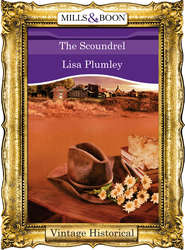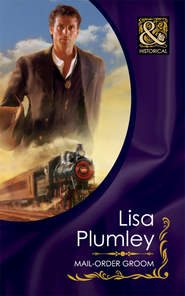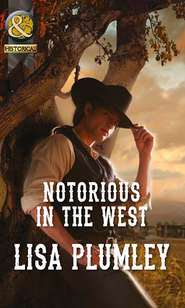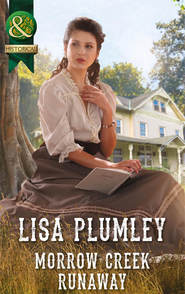По всем вопросам обращайтесь на: info@litportal.ru
(©) 2003-2025.
✖
The Matchmaker
Настройки чтения
Размер шрифта
Высота строк
Поля
Chapter Two
M olly Crabtree just knew she could make a success of her new bakery business…if only she could get outside her family’s front door and get to it.
But today, like nearly every day since she’d opened her shop, Molly was waylaid halfway across the parlor rug by a passel of well-meaning family members. Before long, escape seemed impossible.
Her mother entered the room first, clapping her hands together. “Wait just a minute, Molly May,” she ordered.
Stifling a sigh, Molly turned. She hated it when anyone called her by her full name, as though she were a five-year-old in short skirts, instead of a fully grown woman of twenty-four.
“You’re not seriously contemplating walking to your shop, are you? Alone?” Fiona Crabtree asked. Her upswept gray curls shivered with dismay, and her lips turned downward in a way that never failed to stir guilt, and exasperation, in Molly’s heart.
“I am, Mama. It’s not far, you know.”
Fiona lowered her gaze to the wicker basket filled with cinnamon, a dozen eggs and a cone of fresh sugar that Molly had tucked beneath her arm. As though her youngest daughter had never spoken, she continued, “And with a heavy bundle like that, too? Why, it just won’t do. I’ll send for Ambrose to come drive you in the newspaper’s wagon.”
“Mama, thank you, but I—”
“Not while she’s wearing that blue gingham of mine, I hope!” Out of breath, Sarah Crabtree hurried downstairs with an armload of schoolbooks for her students, eyeballing the gown Molly had filched from their shared bureau this morning. “Papa’s wagon will make it filthy in no time. Do you know how difficult it is to wash out printer’s ink?”
“I promise to take care of it, Sarah,” Molly protested. “As for the wagon—” she faced her mother again, and was dismayed to find Fiona reaching toward her head with a gleam in her eyes—one Molly recognized perfectly well as an uncontrollable desire to redo the chignon she’d already set in her hair. “—please don’t bother Ambrose. I don’t mind walking.”
“You’d best take a shawl, then.” Grace Crabtree, pink cheeked from an early-morning bicycling jaunt with her ladies’ group, paused at the parlor’s entrance, then headed upstairs. Her new custom-made bicycling costume flounced cheerily all the way up the steps. “It’s brisk outside this shortly after sunrise, Moll.”
Molly sighed. A moment later, the family’s cook bustled in from the kitchen at the rear of the house, carrying a napkin-wrapped piece of toasted bread.
She held it toward Molly. “You forgot your breakfast.”
Exasperated, Molly stared at the strawberry jam gleaming atop the toasted bread. To be sure, she loved her family. But just once, she wanted to be treated as though she knew enough to dress properly, confront the weather appropriately, get herself to her shop efficiently…and eat when she needed to. Why couldn’t anyone see that she was a capable woman in her own right?
It was as though she’d never grown up at all. Her family still treated Molly like the four-year-old who’d danced with an imaginary friend. Like the nine-year-old who’d lost countless gloves and hats during daydreaming walks to school. Like the fourteen-year-old who’d expressed an urgent desire to become a famous stage actress and had lost all her meager nest egg buying a talent potion from a persuasive drummer. It was true that Molly was sometimes given to flights of fancy. But that didn’t mean she couldn’t take care of herself, given the opportunity.
Now, though, despite her efforts, Molly had begun to wonder whether that opportunity would ever arrive.
“Thank you,” she murmured, electing to take the bread rather than begin yet another battle she couldn’t win. “Now, I really must be going. Good morning, everyone!”
Juggling her wicker basket of supplies under one arm and the unwanted breakfast in her other hand, Molly stepped toward the parlor doorway to retrieve her bonnet. Almost there. The carved oak of the front door beckoned her, promising escape to a world of her design, only a few feet away.
Her father’s face popped into view as he rounded the banister and leapt from the staircase with his characteristic energy. Shrieking in surprise, Molly jumped. Her basket tumbled. The toasted bread flew upward, then came down again with a swiftness that defied even her father’s speedy movements.
It landed on the shoulder of Adam Crabtree’s favorite worsted wool suit coat. Jam side down.
It was just another typical morning in the Crabtree residence. Mayhem, meddling, flying bread, and all.
Molly was elbow deep in the first batch of her special-recipe cinnamon buns when the bell jangled above her shop door. She looked up, squinting against the early-morning sunlight. At the sight of the man standing on the threshold, her heartbeat quickened.
Goodness—a real live customer!
“Mornin’, Miss Crabtree,” he said politely, doffing his rolled-brim bowler.
Holding it between his restless hands, he looked around, taking in her shop’s floral wallpapered walls, trim blue wainscoting, and shelves filled with napkin-lined wicker baskets waiting to be outfitted with cookies or tea cakes or lemon-raisin pies. From behind her work counter, Molly gave him her best, most welcoming smile. Considering that he was her first customer of the week, and it was already Thursday morning, she couldn’t risk offending him with anything less.
“Come right on in,” she said, inclining her head in what she hoped was a professional-seeming way. It was so hard to tell, when all she had was her father’s own jocular example to go by.
He came inside, letting the door swing shut behind him.
Molly wiped her floury hands on her apron and gestured at the stools she’d optimistically arranged along the work counter. “What can I get you today? I have a small batch of cinnamon buns just about to go in the oven, if you’d care to wait a few minutes for a fresh one. I also have fig gems, apple fritters and a very nice batch of snickerdoodle cookies planned for this afternoon.”
Tentatively he shuffled closer. “That sounds right fine. I ain’t had a snickerdoodle since I left the States.”
At the eager expression on his face, Molly could have kicked herself. She’d given the last three snickerdoodles to Ambrose this morning, for all his troubles in driving the wagon alongside her while she walked to the shop, and hadn’t yet had time to make more. Because her business hadn’t quite turned prosperous yet, it was necessary to make very, very, small batches of everything.
This man looked capable of devouring an entire dozen snickerdoodles, a feat that would have improved her fortunes for the day considerably. Hoping to cultivate his patronage, Molly smiled at him as she went on kneading her cinnamon bun dough.
“The fritters are quite good, too,” she said. “Nobody else in town has baked goods quite like mine, Mr….?”
“Oh. Walter. Thomas Walter,” the man stammered. His face flamed in colors vibrant enough to rival the changing oak leaves outside her window. “I—I’m sorry, Miss Crabtree, but I ain’t come to buy anything today.”
“You haven’t?”
“No.” He looked abashed, probably at her undoubtedly crestfallen expression. “I came because Mr. Copeland asked me to fetch you to the lumber mill this mornin’.”
“Copeland’s lumber mill? Why, I was planning on going out there later today as usual, but I—”
She stopped herself before she could admit the truth: Molly had almost decided to end her daily jaunts to the edge of town. More and more, the notion of selling her baked goods to the lumbermen who worked there seemed an impossible goal. Which was a shame, truly. More than half the men in town worked at Copeland’s mill. Securing them as customers would give her bakeshop a reliable source of revenue. Or would have, if not for…
Marcus Copeland. The mill’s owner—and her nemesis.
Molly meant that good-naturedly, of course. Truly, she did. But the man was a constant obstacle to her business goals for her bakery. Which was funny, really, because if anyone needed something sweet in his life, it was that stick-in-the-mud Marcus.
She’d discovered as much upon learning that he’d apparently given orders for his men not to leave the mill’s premises until the workday was done. By then, all his men wanted was dinner, not sweets. Now, after all that, he wanted to see her? And hadn’t even bothered to make the request himself, in person?
More than likely, the arrogant Mr. Copeland was only summoning her now to order her to abandon her temporary, and hopeful, post outside the lumber mill. Once and for all. The very idea put Molly’s back up—especially after the morning she’d just had.
“I was planning on going out there later today, as usual,” she repeated to Mr. Walter sweetly. “But I would be delighted to visit earlier, instead. Just as soon as I finish this batch of cinnamon buns. Would you tell Mr. Copeland that, please?”
“Yes’m.” Jerking his gaze from the front of her dress, Thomas Walter slapped on his hat and hurried out the door.
Left alone, Molly ducked her head. She examined the front of her borrowed, perfectly ordinary blue gingham dress. When she saw nothing there of interest—no wayward splatters of oil from fritter frying, no blobs of sticky date filling from gem making, merely the usual sprinkling of flour—she narrowed her gaze. Evidently the snickerdoodle-fancying Mr. Walter had an eye for more than sweets.
He had an eye for bosoms, too.
Not unlike many of the men in Morrow Creek, Molly had noticed to her chagrin. Wherever she went, the town bachelors seemed to glue their gazes to her bodice. Their appreciation might have moved her more had she not recognized it as completely superficial—not unlike the Crabtree sisters’ admiration of a new hat they’d like to own or a pair of buttoned-up brogans they’d like to possess.
Being equated with a desirable possession did not appeal to Molly—however much the men in town seemed oblivious to her feelings on the matter.
She wanted to find a beau who appreciated all of her. Fortunately, her mother and father understood that. They hadn’t pressed her into taking up with the occasional would-be beaus who’d called on her. Adam and Fiona Crabtree’s sometimes-radical views offered all their daughters the freedom to wait for a loving marriage, not a union spurred by bosomy interest. Unfortunately, the men inclined toward such an arrangement did not appear to live in Morrow Creek, at least in Molly’s experience.
It was lucky, she decided as she hastened to roll out the springy, yeast-scented dough, that the matchmaker was working so diligently to pair up the men with suitable wives.











